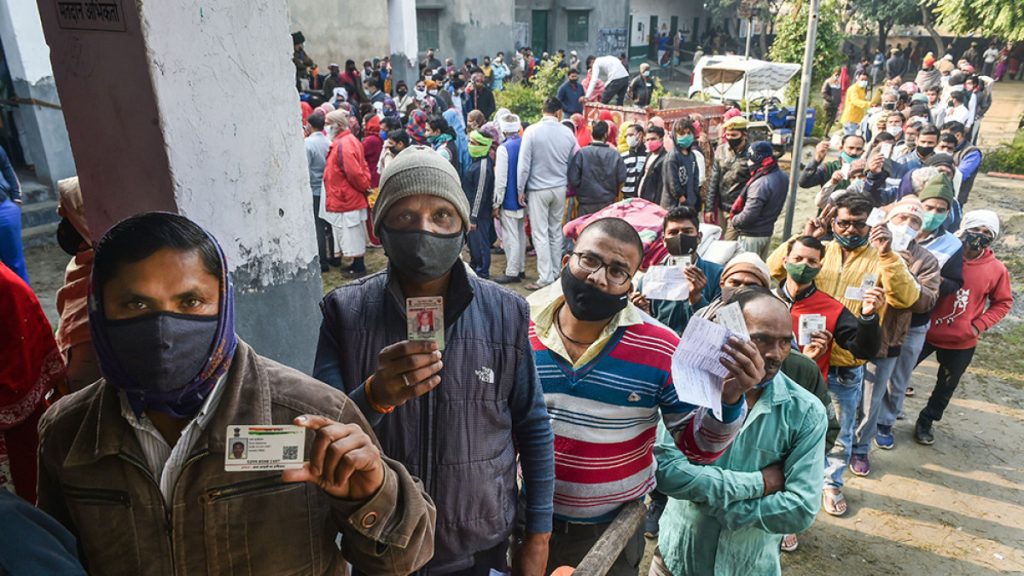The battle of ballots for the most crucial state in Indian politics – Uttar Pradesh – has begun just as four other states, Punjab, Goa, Manipur and Uttarakhand, are getting ready for polls in the next few days. That the outcome in UP will have a decisive effect on the fate of the Narendra Modi government at the Centre in the next Lok Sabha election due in 2024 is clear from the desperation of the BJP to retain the state for which it has degraded the electoral discourse to an all-time low. Chief Minister Yogi Adityanath has taken the lead in communalizing the narrative. Significantly, the Election Commission is watching the shameful spectacle helplessly as if it is not an autonomous Constitutional body, but a government department. By contrast, the BJP’s arch rival and chief of the Samajwadi Party Akhilesh Yadav and the national president of Rashtriya Lok Dal Jayant Chaudhary are showing remarkable restraint in their responses to the provocative remarks of Adityanath. The worst of the string of communal rhetoric the UP CM uttered was his attempt to infuse fear into the electorate by warning them that if the BJP is not returned to power, UP will turn into Bengal, Kerala and Kashmir, the implication being that the three states appease the minority population for capturing power. Such overt attempt to communalise the electoral process goes against the election model code of conduct but no action seems possible by the EC.
The recent ‘hijab’ issue of Karnataka has also assisted the BJP in changing the narrative from serious issues of economic failures, unemployment, all round price rise and poor governance. From the college students who started all the confusion to national and international media and the Courts, talk is only of superficial religious clothing. The Moslem intelligentsia too has been contributing to the growth of the BJP by its eerie silence, especially during election time.
The Election Commissioners, all bureaucrats, also seem to be too petrified before the might of the BJP ruling at the Centre and the state of UP to take any action against the flagrant breach of electoral norms.
Yogi Adityanath’s rhetoric on Kerala, Bengal and Jammu and Kashmir could have been construed as acceptable electoral brownie points had the objective been to suggest that UP had much to lose in socio-economic terms if it were to go the way of the three states he mentioned. But, that was not the reason since Kerala ranks among the best in conforming to socio-economic indicators, J&K is above average while West Bengal is ahead of UP on most counts. The intent was, without doubt, to raise the communal bogey. Again, Kerala and J&K (the Kashmir Valley specifically) have a higher proportion of Moslems than the rest of the country while West Bengal also has an above average composition of Moslems (nearly 26 per cent). What Adityanath was driving at was that the three states/UT have a significant minority representation. This is unlike UP, where despite minorities being close to 20 per cent of the population, their corresponding proportion in the outgoing Assembly was much lower at 5.9 per cent. Moslem legislators are absent in the ruling BJP, though the party won more than three fourths of the seats in 2017. In such a scenario, as Adityanath hinted, an electoral defeat for the BJP would mean higher minority representation. His warning is against such a prospect. However, it also should be noted that the 20 per cent Moslems in UP may not necessarily be voting for candidates of only their religion. Possibly their votes had been divided in past.
To be fair with the Yogi Adityanath government it did try to address the livelihood issues through welfare delivery such as direct benefit transfers and Centrally-sponsored schemes. But people of the state were given a raw deal during the COVID-19 pandemic with inadequate primary health infrastructure. The way unidentified bodies, victims of the virus, were dumped into the river Ganga shocked the conscience of the nation and it should be a major poll issue. Adding to the woes of the BJP government, the farmers’ movement against the three farm laws in western UP could influence the electoral outcome just as the discontent among the OBC groupings in the state which feel deserted by the party in power. Considering these factors, the BJP probably fears that not only it may fail to repeat the success of 2017, but may even lose the state. The efforts at whipping up communal passion and the showering of sops at the eleventh hour may betray that fear of the BJP in UP.
Interestingly, Akhilesh Yadav, when asked about Adityananth’s ‘tamachawadi (pistol-loving)’ remark, only smiled and said, “He (Adityanath) is the first chief minister in India’s history who got criminal cases withdrawn against him. The cases are testimony to his integrity in public life.” Similarly, Jayant Chaudhary has maintained decorum in public. Reacting to the “garmi nikaal denge” (will let out the hot air) barb of Adityanath at an election rally, Chaudhary said, “People should vote to remove the charbi (flab) of the BJP leaders.”
In a way what is being witnessed in UP is but a continuation of what the BJP did only a few months back in Bengal. Many believe the PM’s lampooning of TMC chief Mamata Banerjee at election rallies with his “Didi-o-Didi” banter alone cost the BJP dearly in Bengal where the party was moving well in its aim of dislodging the TMC from power for many of its omissions and commissions.
Stoking communal passion may help a party reap electoral dividends for some time, but what it will yield this time through has to be observed carefully as an indication of how the average voter of north India sees the country shaping up in the future.
